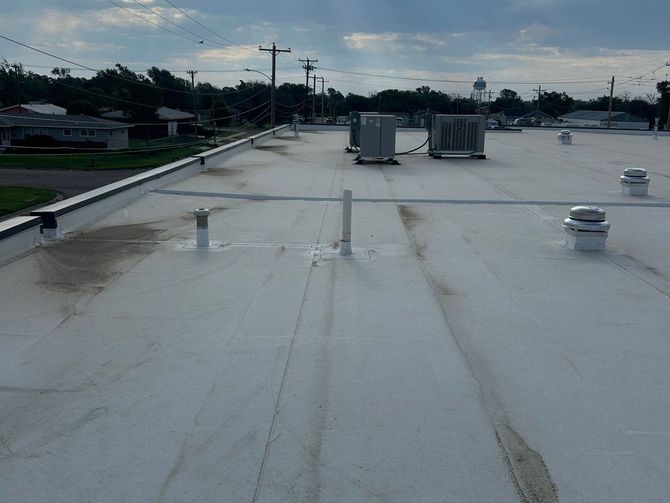Choosing the proper industrial roofing system is essential for protecting your property and enhancing its longevity. In this article, we’ll walk you through the key factors in selecting the right roofing system and maintaining it properly to avoid costly mistakes.
Important Factors to Consider in Industrial Roofing Projects
Industrial roofing requires careful planning and consideration due to the unique needs of large-scale properties. Some key factors to keep in mind include:
- Building Use: The type of building determines roofing needs, whether for heat resistance, weather protection, or soundproofing. Consider the building's use to select the appropriate roofing material.
- Environmental Conditions: Different weather conditions, like extreme heat, heavy rainfall, or snow, can influence the durability of your roofing system. Choose materials suited to your area’s environment.
- Budget: Budgeting is essential when considering industrial roofing, as it’s a substantial investment. Find a balance between quality and cost to maximize your value.
- Energy Efficiency: Energy-efficient roofing materials can reduce your long-term energy bills. Look for options that enhance insulation and reduce heating and cooling needs.
Types of Industrial Roofs: Built-Up, Metal, and Modified Bitumen
Various industrial roofing systems are available, each with unique benefits depending on the requirements of your building. Here are the most common types.
Built-Up Roofs (BUR)
Built-up roofing systems (BUR) are composed of several layers of materials, such as tar and gravel, providing excellent waterproofing and durability. However, this system can be complex and labor-intensive to install.
Metal Roofs
Metal roofs are widely used in industrial settings because of their durability and low maintenance. They withstand harsh weather conditions and are energy-efficient, reflecting sunlight to cut cooling costs. Various materials, such as steel and aluminum, are available.
Modified Bitumen Roofs
Modified bitumen roofing combines asphalt with rubber or plastic polymers, offering flexibility and durability. It’s especially well-suited for low-slope industrial buildings and can be installed with heat or cold processes. Modified bitumen is highly resistant to leaks and offers long-lasting protection, making it a reliable choice for industrial roofs.
Maintenance Tips to Extend the Life of Your Industrial Roof
To avoid costly repairs and extend the lifespan of your industrial roof, regular maintenance is crucial. Follow these tips to keep your roof in excellent condition:
- Regular Inspections: Regular inspections by professionals can help detect early issues like cracks, leaks, or debris accumulation before they turn into major problems.
- Clean Gutters and Drains: Clear gutters and drains of debris to prevent water buildup that could result in roof damage.
- Prompt Repairs: Address any issues quickly to prevent further damage. Delaying repairs can result in larger, more expensive problems later.
- Coating and Sealing: Applying a protective coating to your roof can help prevent moisture penetration and UV damage, extending its lifespan.
The Importance of Hiring a Specialized Roofing Contractor
Because industrial roofing projects are unique, it’s crucial to hire a contractor with specialized experience. They can ensure proper installation, recommend the right materials, and provide maintenance support.
Final Thoughts: Industrial Roofing for Your Business’s Long-Term Needs
The right industrial roof is vital for property protection and long-term savings. Whether you choose BUR, metal, or modified bitumen, understanding each system’s advantages helps make the best choice. Partner with a roofing expert for optimal results.
Ready to begin your industrial roofing project? Get in touch with us for expert advice and customized solutions tailored to your needs.

#IndustrialRoofing #CommercialRoofing #RoofInstallation #BuiltUpRoof #MetalRoofing #ModifiedBitumen #RoofMaintenance #EnergyEfficientRoofing